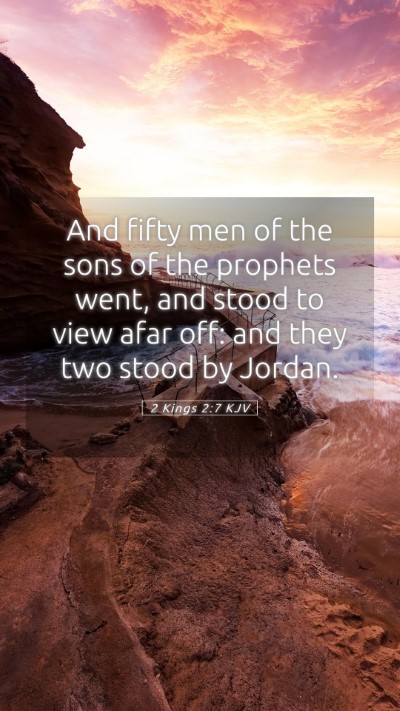Understanding 2 Kings 2:7
Bible Verse: 2 Kings 2:7
In this scripture, we find a pivotal moment in the transition of leadership from the prophet Elijah to his successor, Elisha. This verse states: "And fifty men of the sons of the prophets went, and stood to view afar off: and they two stood by Jordan." (2 Kings 2:7, KJV)
Bible Verse Meaning
The study of this verse invites us to delve into its profound meanings and implications within the life of the prophets and the unfolding narrative of the Israelite history.
-
Significance of Location: The verse notes that they stood by the Jordan River, a significant location in Biblical history associated with both physical and spiritual crossings. Matthew Henry emphasizes the importance of this setting as part of the divine plan and transition.
-
The Sons of the Prophets: The mention of "fifty men of the sons of the prophets" highlights a group devoted to the prophetic calling. Albert Barnes points out their role as witnesses to Elijah's ascension and their connection to prophetic traditions.
-
Symbolism of Watching: The act of standing "afar off" underscores the theme of observation and the anticipation of God's plan unfolding, as explained in depth by Adam Clarke. This distance represents both respect and the gravity of the moment.
Bible Verse Interpretations
This verse can be viewed through various lenses, including historical, theological, and practical implications:
-
Historical Context: Understanding the significance of the prophetic office during this time aids in grasping the gravity of the events occurring. The “sons of the prophets” represented a school of discipleship akin to modern-day Bible study groups.
-
Theological Implications: Scholars like Clarke emphasize the divine orchestration in transitions of leadership, reflecting God's sovereignty and preparation for the future of Israel.
-
Application in Daily Life: The moment captured in this verse encourages believers today to recognize the importance of mentorship and the legacy of spiritual leadership in their communities.
Bible Verse Commentary and Analysis
Various commentaries explore the depth of this passage:
-
Matthew Henry's Commentary: Henry reflects on the significance of Elijah's role and the expectations placed upon Elisha. He notes the transition of prophetic authority and its implications for Israel's spiritual journey.
-
Albert Barnes' Notes: Barnes provides insight into the symbolic nature of the Jordan River as a boundary, representing transitions both in spiritual and personal journeys of faith.
-
Adam Clarke's Commentary: Clarke delves into the character of the “sons of the prophets” and their role as witnesses to divine acts, framing them within the broader narrative of God's relationship with His servants.
Cross References
This verse relates closely to other passages that highlight similar themes:
- 1 Kings 19:19-21: The calling of Elisha as Elijah's successor.
- Joshua 3:15-17: The crossing of the Jordan River by the Israelites, symbolizing faith and obedience.
- 2 Kings 2:11: The actual ascension of Elijah into heaven, with Elisha as the witness.
Final Thoughts
In summary, 2 Kings 2:7 provides a crucial insight into the prophetic tradition and the continuity of God's work through chosen individuals. The verse emphasizes the importance of observation, respect for spiritual authority, and a recognition of God's sovereignty in the significant transitions of leadership. Readers are encouraged to explore this verse within the context of Bible study resources and discussions, as it can yield profound insights into both the historical and spiritual dimensions of faith.
Engagement and Further Study
For those seeking deeper biblical exegesis, exploring this passage in the context of a Bible study group or using online Bible study tools can enhance understanding. Consider utilizing various Bible study guides that focus on prophetic literary forms or engage in discussions around themes of mentorship and spiritual succession.


